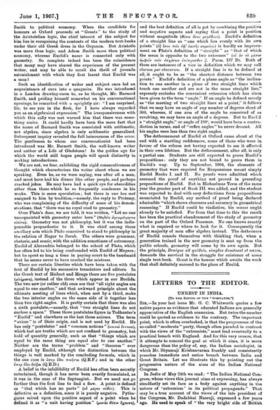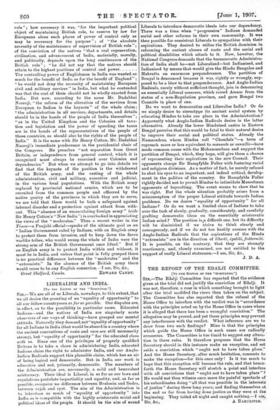LETTERS TO THE EDITOR.
UNREST IN INDIA.
[To TOP waives OP TON &giant-cowl
Sin,—In your last issue Mr. G. C. Whitworth quotes a few native papers as evidence that educated Indians are generally appreciative of the English connexion. But twice the number could be quoted as evidence to the contrary. The important point, which is often overlooked, is that the programme of the so-called " moderate " party, though often paraded in contrast with the views of the "extremists," must lead eventually to a practical breach with England. And for this very reason, that it attempts to conceal the goal at which it aims, it is more dangerous than the policy of, say, the Indian sociologist, in which Mr. Shyamaji Kriehnavarma frankly and consistently preaches immediate and entire breach between India and Great Britain. Let use illustrate this by pointing out the progressive nature of the aims of the Indian National Congress.
In India of May 24th we read: "The Indian National Con. gress, whose views this journal aims at expressing, has always steadfastly set its face as a body against anything in the nature of 'extremism' in its political propaganda." That may be a true account of the views of the late president of the Congress, Mr. Dadabhai Naoroji, expressed a few years ago. He used to speak of "the very bright side of British
rule " ; how necessary it was, "for the important political object of maintaining British rule, to reserve by law for Europeans alone such places of power of control only as may be necessary for the purpose'; of "the absolute necessity of the maintenance of supervision of British rule "; of the conviction of the natives "that a real regeneration civilisation, and advancement of India, materially, morally, and politically, depends upon the long continuance of the British rule" ; "he did not say that the natives should
attain to the highest positions of control and power The controlling power of Englishmen in India was wanted as much for the benefit of India as for the benefit of England" ; "lie would not deny the necessity of maintaining European civil and military services" in India, but what he contended was that the cost of them should not be wholly exacted from India. But now, according to the same Mr. Dadabhai Naoroji, "the reform of the alteration of the services from. European to Indian is the keynote" of the whole claim; "the administration in all services, departments, and details should be in the hands of the people of India themselves"; "as in the United Kingdom and the Colonies all taxa- tion and legislation and the power of spending the taxes are in the hands of the representatives of the people of those countries, so should also be the rights of the people of Indie." It is the same with Sir Henry Cotton, Mr. Dadabhai Naorojrs immediate predecessor in the presidential chair of the Congress. He preaches "not separation from Great Britain, or independence from general control, which it is recognised must always be exercised over Colonies and dependencies." But when we attempt to go into details we find that the keynote of the position is the withdrawal of the British army, and the vesting of the whole administration, civil and military, executive and judicial, in the various local populations. With the British army replaced by provincial national armies, which are to be recruited from the common people and officered by the native gentry of the provinces in which they are to serve, we are told that there would be both a safeguard against internal disorder and a protection against attack from with- out. This "absence of an emasculating foreign army" (vide Sir Henry Cotton's "New India") is overlooked in appreciating the views of the "moderates," Thus a recent writer it; the Times—a Puujabi official—speaks of the ultimate goal as an " Indian Government ruled by Indians, with an English army to protect them from invasion, and to keep down the fierce warlike tribes, who would sweep the whole of India were the strong arm of the British Government once lifted." But if an English army is to protect India within and without, it must be in India, and unless that point is fully grasped there is no practical difference between the "moderates" and the "extremists." In the absence of the British army there would cease to be any English connexion. —I am, Sir, &c.,







































 Previous page
Previous page